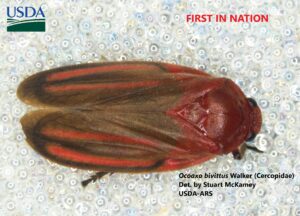CBP agriculture specialists intercept first in the nation pest at Laredo Port of Entry
Written by Post Public Information Representative, May 26, 2023, 0 Comments
Courtesy Richard Pauza,
 LAREDO, Texas – U.S. Customs and Border Protection agriculture specialists at Laredo Port of Entry discovered a significant rare pest last week, a first in the nation interception on a shipment of cut flowers.
LAREDO, Texas – U.S. Customs and Border Protection agriculture specialists at Laredo Port of Entry discovered a significant rare pest last week, a first in the nation interception on a shipment of cut flowers.
“I want to congratulate our agriculture specialists at Laredo Port of Entry for their diligence and attention to detail that resulted in the interception of a first in the nation pest,” said Port Director Alberto Flores, Laredo Port of Entry. “Their outstanding work helps to secure American agriculture from serious economic harm that can be inflicted by infiltration of pest species not known to exist in the U.S.”
On May 17, 2023, agriculture specialists at the Colombia-Solidarity Bridge import lot inspected a shipment of cut flowers. During the examination of the trailer floor, agriculture specialists intercepted a spittlebug or frog hopper that was later identified as Ocoaxo bivittus Walker(Cercopidae) by USDA’s Systematic Entomology Laboratory in Washington D.C. The interception is the first of its kind in the Nation according to USDA’s Pest ID Database. According to USDA entomologists, this pest has never been identified at any of the nation’s ports of entry.
The interception is an example of the diligent work CBP agriculture specialists do on a daily basis and which is crucial in preventing foreign pests from becoming established in the US. Pests that are not known to occur in the U.S. may be detrimental to the Nation’s agriculture industry. Cercopidae sp, are xylem-feeding insects also known as spittlebugs or frog hoppers. They are extremely efficient at jumping, and feed on a variety of plants. This genus in particular is known to attack pine trees and causes a disease called “pine decline.” This shipment was refused entry and returned to Mexico. CBP agriculture specialists continue to fulfill CBP’s agriculture mission by excluding harmful pests and diseases from becoming established in the US.



